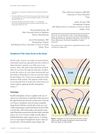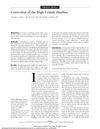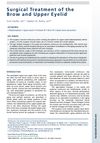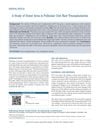 November 2024 in “Clinical Cosmetic and Investigational Dermatology”
November 2024 in “Clinical Cosmetic and Investigational Dermatology” Rosemary oil may effectively treat hair loss with fewer side effects, but more research is needed.
 June 2024 in “Infection and Drug Resistance”
June 2024 in “Infection and Drug Resistance” An adult woman with scalp infection recovered after antifungal treatment, with no return of symptoms.
 March 2024 in “Indian Journal of Dermatology/Indian journal of dermatology”
March 2024 in “Indian Journal of Dermatology/Indian journal of dermatology” Using animal names for skin conditions helps with learning and memory.
November 2023 in “Plants” Compounds from Jatropha cordata bark have significant anti-inflammatory effects and could help with hair loss.
 August 2023 in “International Medical Case Reports Journal”
August 2023 in “International Medical Case Reports Journal” Acne necrotica can be effectively treated with topical cream and antibiotics.
 July 2023 in “Journal of Clinical Medicine”
July 2023 in “Journal of Clinical Medicine” The document concludes that understanding hair follicle histology and the hair cycle is crucial for diagnosing alopecia.

New treatments for hair loss should target eight main causes and use specific plant compounds and peptides for better results.
 March 2023 in “Journal of skin and stem cell”
March 2023 in “Journal of skin and stem cell” Trichoscopy is a good, quick, non-invasive way to diagnose different types of hair loss.
 January 2023 in “International Journal of Molecular Sciences”
January 2023 in “International Journal of Molecular Sciences” Maxillariinae orchids contain 62 compounds with potential health benefits, including treating skin conditions and diseases like cancer and diabetes.
March 2022 in “Journal of Investigative Dermatology” Discoid Lupus Erythematosus causes scalp plaques that can lead to hair loss, and antimalarial drugs are effective treatments.
January 2023 in “Springer eBooks”  13 citations,
November 1973 in “Archives of Dermatology”
13 citations,
November 1973 in “Archives of Dermatology” Hair loss may be an early sign of serious illnesses like Hodgkin disease.
 8 citations,
August 1997 in “Australasian Journal of Dermatology”
8 citations,
August 1997 in “Australasian Journal of Dermatology” Most HIV patients develop skin symptoms that can indicate the stage of their disease.
 6 citations,
July 1990 in “The Journal of Pediatrics”
6 citations,
July 1990 in “The Journal of Pediatrics” A boy with toxic shock syndrome had severe heart rhythm problems but recovered with treatment.
 4 citations,
February 2017 in “Journal of Cutaneous Medicine and Surgery”
4 citations,
February 2017 in “Journal of Cutaneous Medicine and Surgery” Compounds from certain trees used by First Nations people show potential for treating skin conditions and promoting hair growth, but more research is needed to confirm their safety and effectiveness.
 November 2023 in “International journal of biology, pharmacy and allied sciences”
November 2023 in “International journal of biology, pharmacy and allied sciences” Herbal treatments can help with hair problems, but more research is needed.
 January 2018 in “Elsevier eBooks”
January 2018 in “Elsevier eBooks” The document concludes that alopecia has various forms, each with specific treatments, but no definitive cure for certain types like CCCA has been proven.
 February 2006 in “Journal of The American Academy of Dermatology”
February 2006 in “Journal of The American Academy of Dermatology” Most patients with anal Pemphigus Vulgaris had repeated episodes but fully recovered with treatment, without long-term problems.
 February 2007 in “Journal of The American Academy of Dermatology”
February 2007 in “Journal of The American Academy of Dermatology” Hair tonic helps stop hair loss in most users.
4 citations,
March 2022 in “BioEssays” Hydra can help understand human hair follicle microbiomes and develop new skin disease therapies.
 6 citations,
November 2008 in “Hair transplant forum international”
6 citations,
November 2008 in “Hair transplant forum international” Using a special knife helps improve hairline scars from surgery.
 1 citations,
December 2015 in “Dermatologic Surgery”
1 citations,
December 2015 in “Dermatologic Surgery” Double trichophytic closure effectively treats thin scalp scars and reduces patient costs.
 December 2015 in “Dermatologic Surgery”
December 2015 in “Dermatologic Surgery” Double trichophytic closure effectively repairs thin scalp scars, reducing financial burden.
 32 citations,
July 2011 in “Facial Plastic Surgery”
32 citations,
July 2011 in “Facial Plastic Surgery” New hair transplant methods offer more natural results and better graft survival, with ongoing research to increase donor hair options.
 31 citations,
March 2009 in “Archives of Facial Plastic Surgery”
31 citations,
March 2009 in “Archives of Facial Plastic Surgery” The hairline-lowering surgery was effective, safe, and left patients satisfied with few complications.
 14 citations,
March 2015 in “Facial plastic surgery clinics of North America”
14 citations,
March 2015 in “Facial plastic surgery clinics of North America” Individualized assessment and meticulous planning are crucial for successful brow and upper eyelid surgery.
 10 citations,
April 2018 in “Facial Plastic Surgery”
10 citations,
April 2018 in “Facial Plastic Surgery” The surgical technique of scalp advancement and pretrichial brow lift shortens the forehead and lifts brows, is good for women and transgender women with high foreheads, but not recommended for men and has some risks.
 10 citations,
January 2013 in “Journal of Cutaneous and Aesthetic Surgery”
10 citations,
January 2013 in “Journal of Cutaneous and Aesthetic Surgery” Narrower donor strips and special closure techniques in hair transplants lead to smaller scars and happier patients.
 8 citations,
April 2020 in “Facial Plastic Surgery Clinics of North America”
8 citations,
April 2020 in “Facial Plastic Surgery Clinics of North America” Follicular Unit Transplantation is a reliable hair restoration method with a high success rate and minimal scarring.
 7 citations,
October 2011 in “International Surgery”
7 citations,
October 2011 in “International Surgery” In 2011, hair restoration was a specialized field in plastic surgery, using techniques like "Ultrarefined follicular unit hair transplantation" to minimize scarring and promote hair growth, with future treatments like stem cell therapy and hair cloning still being tested.


























